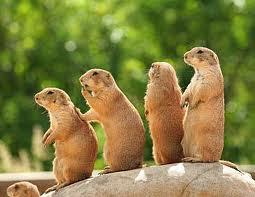Kansas' indigenous mammals include the common cottontail, black-tailed jackrabbit, black-tailed prairie dog, muskrat, black-footed ferret, opossum, and raccoon; the white-tailed deer is the state's only big-game animal. There are 12 native species of bat, 2 varieties of shrew and mole, and 3 types of pocket gopher. Let's study the jackrabbit, black-footed ferret and prairie dog more closely.
The jackrabbit is actually a hare, not a rabbit. All that this means is it is larger than a rabbit, and it has longer ears and hind legs than a rabbit. Jackrabbits were named for their ears, which resemble those of a jackass. They are speedy animals, capable of reaching speeds around 40mph, and they can leap 10 feet into the air! This is their main mechanism for evading their enemies.
The black-footed ferret has a black mask on its face and tan ferrets have black markings on its feet, legs and tail tip. Its long, skinny body is good for crawling through tunnels and holes of prairie dogs, its primary prey. Prairie dogs make up the majority of the black-footed ferret's diet, but it also eats squirrels, mice, and other rodents. They are solitary animals, living alone and females raise their litters alone.
The rabbit-sized prairie dog lives on prairies and open grasslands, and live in underground burrows . This underground system of tunnels and chambers is complex, including nurseries, sleeping areas, and even toilets. They also have listening posts near exits to watch for prey. Burrows may be shared by snakes, burrowing owls, and black-footed ferrets after they prey on the prairie dogs.
The prairie dog is an expressive animal that lives in family groups, which greet one another with a prairie dog kiss or nuzzle, and communicate with loud cries. Sadly, 98 percent of all prairie dogs in the Great Plains have been exterminated for farming purposes.




No comments:
Post a Comment